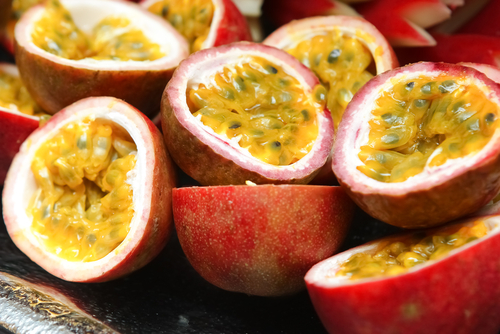Short answer
Passion fruit is a tropical fruit that is highly nutritious-loaded with antioxidants, vitamins and minerals. Passion fruit has wonderful benefits for health and has been recommended for its positive medicinal properties.
Recommended Alternative
Long answer
Passion fruit is a nutritious tropical fruit that is native to the warmer climates of South America. Passion fruit will grow as the fruit of the passionflower depending on the type of passionflower and the environmental conditions. Passion fruit can now be grown outside of tropical areas as long as the vines and flowers are protected from frost. There are multiple types of passion fruit that vary in size and color. The two most popular varieties are purple or yellow in color.
These are:
- Passiflora edulis: Small round or oval-shaped fruits with purple skin.
- Passiflora flavicarpa: Round or oval-shaped with yellow skin.
This small fruit is low in calories and is a good source of vitamin C, vitamin A and fiber. Cutting a passion fruit rind open will reveal juicy seeds with surrounding pulp. The seeds and the pulp have tangy somewhat sweet taste and both are edible. The thick rind is unfavorable in taste and considered inedible because it contains cyanogenic glycosides that could convert to cyanide in the body. In order for this to be a concern, you would have to ingest huge amounts of the rind. Other foods that contain this cyanogenic compound include cassava, yucca, apple seeds, cherry pits, apricot or peach pits, almonds, bamboo shoots and lima beans. Again, huge amounts of these items would need to be ingested to produce adverse effects.
Some health professionals feel that flour made from the rind of the passion fruit can provide health benefits. In 2012 the Natural Products Journal released an article entitled, “Potential Health Benefits of Passion Fruit Peel Flour.” The abstract states that flour prepared from the peels of passion fruit (Passiflora edulis and flavicarpa) demonstrated several health benefits. The flour increased levels of high-density lipoproteins (HDL) in blood, reduced the concentrations of glucose, cholesterol and LDL, as well as lowered blood pressures and body weights in diabetic rats and people. Passion fruit peels have been fed to cattle and there have been reports on increasing milk production and preventing bacterial infections.
Passion fruit is recognized as a powerful antioxidant and anti-inflammatory. Eating passion fruit helps to combat toxic free radicals that enter our bodies daily. We are all surrounded by hundreds of toxins and when toxins enter our body they can enter via our skin, our digestive tract and our pulmonary tract. These impurities have an adverse impact on the body and brain by causing the formation of free radicals. These free radicals cause oxidation of the internal body that can lead to cellular damage and DNA damage. This can obviously predispose to degenerative disease, inflammatory disease, vital organ damage, metabolic syndrome, skin disorders and malignancy. Over the centuries passion fruit has been used for its impressive antioxidant, antimicrobial and anti-inflammatory properties.
Passion fruit is also a good source of riboflavin, niacin, iron, copper, phosphorous, magnesium, potassium and protein. Adding this to your diet will definitely result in overall health benefits.

Benefits
- good source for viamin c and a
- good source of fiber
- contains riboflavin, niacin, iron, copper, phosphorous, magnesium, potassium and protein
- great antioxidant and anti-inflammatory
- natural antimicrobial
- low in calories
Our Wellness Pick (what is this?)
Freeze-Dried Pitaya Powder
- Rich in antioxidants
- High Vitamin C content
- USDA Organic certified
- Vibrant natural color
- Non-GMO project verified
 Approved by
Approved by 















